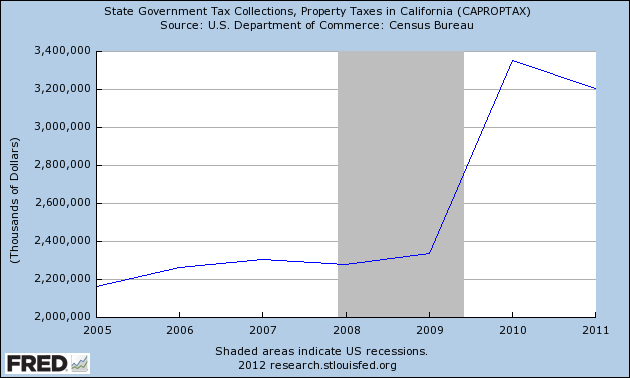Why a split-roll property tax is DOA
by CalWatchdog Staff | June 11, 2012 1:18 pm
June 11, 2012
By Wayne Lusvardi
A proposed ballot proposition circulating for signatures in California for what is called a “spilt tax roll” is dead on arrival at the ballot box in November 2012 should it gather the necessary 807,614 signatures. (See Item 1560[1] — Initiatives Cleared for Circulation, California Secretary of State).
A split tax roll in California would reassess commercial properties every three years, while residential properties would be reassessed only upon resale, as currently provided by Proposition 13[2].
The reason why splitting residential and commercial property tax assessments is toast? New data from the U.S. Department of Commerce show California property taxes have increased about 45 percent since mid-2008, while median home values have declined about 19.5 percent over that same period of time. Houses are worth less, but property taxes have gone up anyway.
Median Home Price & Property Taxes Collected — California
| June 2008 | April 2012 | Percent Change | Percent Change per Year | |
| California Median Home ValueSource: Dataquick | $328,000[3] | $264,000[4] | -19.5% | -5.6% per year (compounded) |
| Total California Property Taxes Collected (approximate) Source: U.S. Dept. of Commerce |
$2.3 billion | $3.2 billion | +45% | +9.8% per year(compounded) |
There is no apparent need to split the property tax roll in California. The real estate market and the circuit breakers of Prop. 13 have already done it.
It apparently is not that commercial properties are not bearing their fair share of the property tax load, or are exploiting tax loopholes, as anti-Prop 13 tax advocates contend[5]. Rather, it is that aggregate single-family home prices are receding and thus not carrying their share of the property-tax burden. Clobbering an already overburdened commercial property tax base composed of 97 percent small businesses[6] with more frequent tax re-assessments is not a viable solution to the state budget deficit.
This trend of increasing property taxes and falling home values is nationwide, but is worst in California. Despite home prices falling off a proverbial cliff in California since 2008, property tax collections have increased by 45 percent.
In other words, the median home price in California has fallen by 5.6 percent per year since 2008, but property tax collections have risen by 9.8 percent per year over the same time frame on a compounded basis.
 [7]
[7]
Prop 13 is not to blame for the continuing state budget deficit.
Home prices can’t recover because rising property taxes are consuming much of the expendable household income.
Claiming that commercial properties are not bearing their fair share of the property tax load is deceptive. It is residential home values, and thus, the residential property tax base that is declining instead. Any proposal to split residential and commercial property tax re-assessments is dead on arrival at the ballot box come November.
- Item 1560: http://www.sos.ca.gov/elections/ballot-measures/cleared-for-circulation.htm
- Proposition 13: http://en.wikipedia.org/wiki/California_Proposition_13_(1978)
- $328,000: http://dqnews.com/Articles/2008/News/California/RRCA080718.aspx
- $264,000: http://www.dqnews.com/Articles/2012/News/California/RRCA120517.aspx
- anti-Prop 13 tax advocates contend:
- 97 percent small businesses: http://www.calwatchdog.com/2012/04/19/ending-prop-13-would-slam-small-business/
- [Image]: http://www.calwatchdog.com/2012/06/11/why-split-roll-property-tax-is-dead-on-arrival/lusvardi-chart-june-11-2012/
Source URL: https://calwatchdog.com/2012/06/11/why-split-roll-property-tax-is-dead-on-arrival/